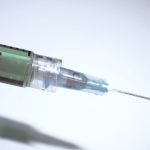 A new injection can treat herpes by charging up the body’s immune system to fight the virus, scientists believe.
A new injection can treat herpes by charging up the body’s immune system to fight the virus, scientists believe.
The vaccine – which would become the world’s first for the Herpes Simplex Virus type 2 virus (HSV-2) – was found to reduce the activity of the infection.
Despite there being no cure for the sexually transmitted infection, symptoms can be controlled through medicine.
Visibility of the virus on the skin around the genitals was reduced by 60 per cent as a result of the jab, researchers found.
Given over a course of three injections, the effects of the GEN-003 vaccine last for up to one year and cut the number of outbreaks in sufferers.
It works by stimulating antibodies in the bloodstream in an attempt to make the virus ineffective.
The injection recruits white blood cells which circulate around our bodies searching for any infections.
More than 500 million people suffer from the virus worldwide, and the new discovery could significantly lower the rate of transmission and outbreaks, experts say.
Current treatments for the virus include medications which are taken to treat outbreaks and to reduce the risk of sexual transmission.
In fact, the injection could become even more powerful if used in combination with existing medicines.
Dr Kenneth Fife, Professor of Medicine at Indiana University, said while several previous preventative vaccines have failed in the past, the new approach which boosts the immune system may one day lead to an effective vaccine that prevents herpes.
He said: ‘GEN-003 is expected to be tested in combination with antiviral medications to potentially provide a level of relief not currently achievable.
‘GEN-003 is believed to work through a different pathway from most vaccines by recruiting T cells, which are critical to controlling chronic infections such as herpes.
‘The importance of these clinical findings is that it represents a new approach to treatment, and may provide a new option for patients suffering from chronic, recurrent genital herpes.’
Researchers tested on 310 participants with a history of chronic, recurrent genital herpes.
They received three shots of one of six different vaccine doses, 21 days apart.
Over one year, participants were tested for stimulation of the immune system against the herpes virus.
They were also measured for the frequency of their virus being detectable on the skin around the genital area (viral shedding) and the number of days that herpes outbreaks (lesions) were visible.
The new injection was found to significantly reduce the rate of viral shedding and lesion frequency compared to before treatment.
Genital herpes is a chronic condition and remains in the body for ever, as it can become active at any time.
Passed on through sexual contact, the virus causes painful blisters to emerge on the genitals.
The virus recurs up to five times within the first two of being infected in most people, however outbreaks reduce over time.
Common in people aged between 20 and 24, the symptoms can be controlled using antiviral medicines.
Doctors advise people to avoid sex until symptoms of the virus have passed to help prevent the spread of the infection – and to continue using a condom after.
Source: Mail Online

















